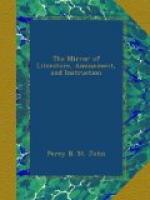statement, that as to the pleasure of a segar, none
but those who used them ought to express an opinion
upon the point—that to appeal to experience,
tobacco was in more universal use among nations than
bread corn—that it had been known to stay
the plague, and was the friend and companion of rich
and poor. These statements were met with undisguised
contempt, and it was retaliated, that the practice
of using tobacco either by smoke or snuff, was a nuisance
to others, thus infringing the very primary principles
of civil liberty—that it led to drunkenness
and debauch—that snuff spoiled the complexion—stopped
the nose to the perception of odours—and
that as to the ladies, they would positively spurn
any approach of familiar friendship from a snuff-taker.
This raised the concealed anger of the snuff-takers,
who had hitherto maintained a stubborn neutrality while
the argument was kept to smoke. They replied both
by wit and invective—they affirmed snuff
to have a moral use—“Dust to dust”—would
remind them of the brevity of life—that
the king and ministers patronized the habit, and gave
away L10,000 worth of snuff-boxes in every year—that
as to the nose being blockaded, that was a happy circumstance
to London residents, and enabled them to acquire the
French accent more naturally—that as to
the assumed yellowness of complexion complained of,
it was only studious and Werter-like—and
that as to the ladies refusing to be saluted by snuff-takers,
that was a thing which modesty and prudence required
them to sneeze at. The historian might add by
way of reflection, that nothing could more clearly
show the national freedom from anxious cares, when
it was thought that the public took interest in the
comparative merits of blackened teeth or a snuffy
pocket-handkerchief.—
The Inspector.
* * * *
*
FASHIONABLE NOVELS.
Of the slip-slop reading, under this denomination,
with which the town has lately been inundated, the
following is a fair specimen:—
Hyde Nugent.—The book is made up
completely of the gossip of drawing-rooms, hotels,
dinners, and balls. As to the hero, if any one
has a grain of curiosity about him—gratify
it. Hyde is the son of a man of family and fortune;
he goes to Oxford, fights a duel, and is expelled—prevails
upon a marquess to break the matter to the father—falls
in love with the marquess’s daughter—goes
large and loose about town—is every where
introduced—and one of every party.
Notwithstanding certain warnings, and his own disgusts,
he frequents Crockford’s—gets plucked,
and moreover deeply involved with the Jews. In
the meanwhile he does not neglect the marquess’s
daughter. They soon come to an understanding.
He is irresistible—she is an houri.
But the consciousness of his embarrassments press
heavily upon him, and he is on the point of taking
some desperate step, when he is summoned to attend
a friend in a duel, who kills his antagonist; and
he and Hyde are obliged to fly. This rescues
him from his gaming associates; though he gets among
others at Lisbon, and narrowly escapes assassination.
On his return to England, his sister has married a
duke’s eldest son, and all the family visit
the said duke’s, and there also assemble the
aforesaid marquess and his beautiful daughter.




